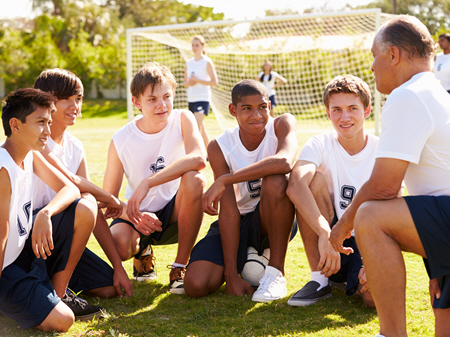 Teams make the world go round.
Teams make the world go round.
Teams are crucial to sports, schools, small companies, medical offices, high-risk occupations, and non-profit organizations.
Teams often bring a lot of different experiences and emotions. Each team member has an integral role that makes the mission possible – both an exciting and difficult reality.
In sports, the entire team must execute game plans, and teammates can pick up a player who is having a tough night.
Business teams need good leadership and the ability to plan, problem-solve, and make decisions for a common vision.
Teams that serve others and deal with dangerous situations must be clear on procedures, communicate exceptionally well, and manage stress.
 Unfortunately, teams often perform below their capabilities.
Unfortunately, teams often perform below their capabilities.
Sometimes they lack knowledge.
When asked what makes optimal performance on sport teams, players provide a variety of answers. Some point to exceptional technical skills, some reference their discipline, others their positive mindset. Teams often lack clarity and understanding of what contributes to optimal performance. Without this information, they can’t monitor their shortcomings. Team members can learn about themselves, how to become experts in their sport, and how to work well within the structure of a team.
Sometimes they don’t have the right skills.
“You either have it, or you don’t” is a bad trap for any team to fall into. Skills can be built. Sometimes business teams are so overwhelmed that effective skill building falls by the wayside. They often fixate on technical skills and leave out the incredibly important mental and interpersonal skills that make high-performing teams. Imagine a team that not only uses the best methods for learning skills, but is also full of good decision makers with resilient minds and the emotional intelligence to perform consistently well.
Sometimes they can’t manage or overcome obstacles.
Some organizations dread obstacles. Hearts sink, and stress ramps up just thinking about it. Obstacles don’t deal in “if” but in “when.” An inflexible team will experience performance issues. A team should have good systems to absorb obstacles and effectively manage the conflict and stress that comes with them. Teams need the right lens to view obstacles and the resources to get back on track.
Sometimes the team dynamics aren’t right.
A company that lacks trust, respect, commitment, and accountability can’t perform its best. Even if you have competent employees, they need to be able to work together to get results. Leaders need to develop environments where people are heard and supported. Teams should have clear directions, be capable of collaboration, and utilize both success and failure.
Think about it: Even teams with superstar individuals are not always successful. An aware, skillful, and synergized team is capable of so much more.
 Some important things to know about teams…
Some important things to know about teams…
Individuals on teams need to understand themselves and their environment.
What are their tendencies and responses to the environment and others? With this awareness and building key self-management skills, individuals can give to and receive from an effective team.
High-performing teams work hard to create environments where they can thrive.
They are willing to change their thinking and behavior. They embrace mental skills, learn about each other, and develop quality systems.
Here’s how mental performance training can help your teams…
Defining values, roles, goals…
Have you ever felt like your team was trying to accomplish too many things? Maybe there was disagreement on what was most important, or individual goals reigned supreme. We can work to give your team clarification on what they value, the responsibilities of each member, and what everyone is working toward. Your team can maximize effort and have a clear direction to achieving success.
Managing stress…
Has your team been overwhelmed by pressure and expectations? They struggle to keep pace and perform well despite the burdens. In a world where everything matters and there are a lot of changes, flexibility is the name of the game. Your team can learn techniques that reduce stress in the body and have a more positive relationship with it mentally.
Communication…
Have you ever been part of a team where assumptions created major problems? Or did conflict avoidance lead to poor service to clients? Communication can go from an obstacle to an advantage for your team. We can work to develop better communication methods for crucial information. Your team can learn to share openly, invite ideas, and demonstrate respectful debate for the good of the team.
 Motivation and satisfaction…
Motivation and satisfaction…
Has your team ever seemed to be dragging, deadlines weren’t being met, and morale was going down? We can work on using values and committing to realistic goals for steady success. We can work on learning techniques to help members feel like part of the team and be committed to the team mission. Your team can be engaged in opportunities and willing to go through the grind.
Growth environment…
Teams are often afraid to take a risk. There is fear in making mistakes, and members tend to keep things quiet for fear of judgment. Mistakes can be used as learning opportunities. Workplaces can be where people feel safe with imperfections and are willing to take opportunities for growth. This creates more competent team members and sparks innovation.
Productivity…
Productivity is the name of the game for so many teams. Without quality productivity, the team is not successful. But many go about it in a way that is not effective or sustainable. What if your team could better understand the effects of workloads and how to organize and prioritize tasks? Members can learn methods for full engagement in the tasks and managing distractions.
Critical thinking and decision-making
Has your team struggled with problems that were messy and lacked clear answers? These problem sets often lead to ineffective solutions despite the effort. Teams don’t need to be bogged down by all the variables and can avoid thinking traps. Critical thinking skills lead to a complete understanding and foster better options for success.
 When we work together…
When we work together…
You understand your experience best, so I learn your goals and processes from you. I then provide my expertise to meet your team’s or group’s needs. We’ll use new skills and proven methods to achieve your goals and improve your situation and performance.
Team or group training often requires multiple sessions. The time varies, depending on how many items you are trying to address and the skills you are looking to develop. Teams can see improvement quickly, but adopting new behaviors and processes takes time.
Work with teams can take place in stand-alone sessions or during practice and games. Sessions are best in person at your site but can also be done online.
The time is now…
Your team has important and meaningful things to accomplish.
Don’t continue to work through the burdens on your own.
I can help your team find optimal performance.
Call today and learn more during your free 30-minute consultation: (760) 554-3982.

